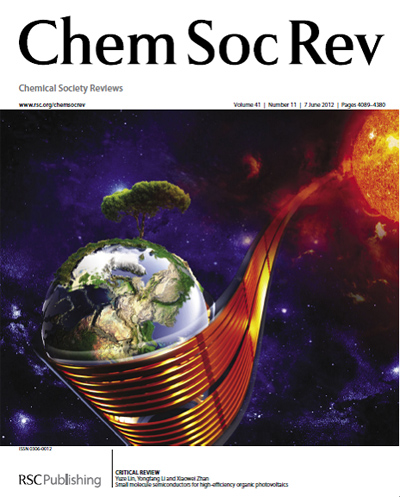Recently, organic solar cells (OSCs) have attracted much attention due to their unique advantages such as low cost, flexibility, light weight, and large-area device fabrication. Much of the focus has been on the development of polymer solar cells that have seen a dramatic rise in efficiency over the last decade. Encouraging power conversion efficiencies (PCE) as high as 7-8% have been achieved from blends of polymer donors and fullerene acceptors. Small molecules offer potential advantages over conjugated polymer counterparts in terms of defined molecular structure, definite molecular weight, high purity, easy purification, easy mass-scale production, and good batch-to-batch reproducibility. However, much less attention has been devoted to small molecule solar cells that have lagged behind their polymer counterparts.Now the PCE of solution-processed bulk heterojunction (BHJ) solar cells based on small molecules is still lower than that of polymer/fullerene derivative BHJ solar cells. The relatively lower efficiency of small molecular BHJ OSCs becomes the biggest hindrance to their application.
Under the financial supports of National Nature Science Foundation of China, Ministry of Science and Technology of China and Chinese Academy of Sciences, researchers at Institute of Chemistry, Chinese Academy of Sciences, designed and synthesized a series of 1D D-A-D small molecule donors, which afforded PCE up to 3.7% in combination with PC71BM acceptor (Adv. Energy Mater., 2012, 2, 63-67). Furthermore, they designed and synthesized a novel 3D, star-shaped, D-A-D organic small molecule donor, which exhibited excellent thermal stability, broad and strong absorption, relatively high mobility, and relatively low HOMO level. Solution processed OSCs based on blend of this molecule donor and PC71BM acceptor afforded a PCE as high as 4.3% without any post-treatments, e.g. thermal annealing, solvent annealing, or additive addition, which was among the highest reported for solution processed OSCs based on small molecules (Adv. Mater., 2011, 23, 1554-1557). This paper was cited 45 times within 1 year and was selected as one of ESI Highly Cited Papers and Hot Papers. They also created a novel 3D star-shaped nonfullerene small molecule acceptor, which exhibited very high open-circuit voltage (1.18 V) in solution-processed OSCs(Chem. Commun., 2012, 48, 4773-4775).
Very recently, they published an invited Critical Review entitled “Small molecule semiconductors for high-efficiency organic photovoltaics” (Chem. Soc. Rev., 2012, 41, 4245-4272, Inside Cover).

Chem. Soc. Rev., 2012, 41, Inside Cover ( Imaged by Zhan Xiaowei )
